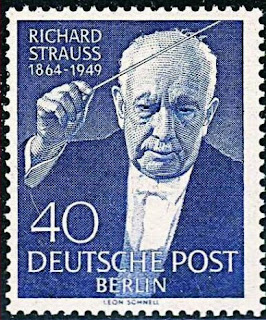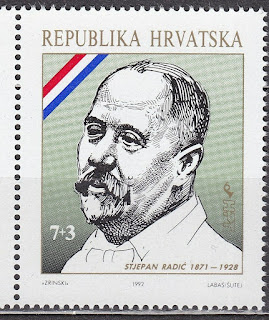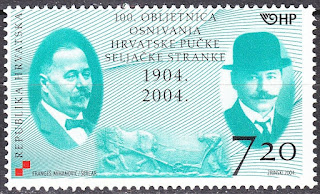Here are some events that happened on June 11th. It could be an event or a person that died or was born on that day
1864 Born: Richard Strauss, German composer and conductor (d. 1949)
Richard Georg Strauss (11 June 1864 – 8 September 1949) was a leading German composer of the late Romantic and early modern eras. He is known for his operas, which include Der Rosenkavalier, Elektra, Die Frau ohne Schatten and Salome; his Lieder, especially his Four Last Songs; his tone poems, including Don Juan, Death and Transfiguration, Till Eulenspiegel's Merry Pranks, Also sprach Zarathustra, Ein Heldenleben, Symphonia Domestica, and An Alpine Symphony; and other instrumental works such as Metamorphosen and his Oboe Concerto. Strauss was also a prominent conductor in Western Europe and the Americas, enjoying quasi-celebrity status as his compositions became standards of orchestral and operatic repertoire.
Strauss, along with Gustav Mahler, represents the late flowering of German Romanticism after Richard Wagner, in which pioneering subtleties of orchestration are combined with an advanced harmonic style.
Stamps from Berlin and Vatican City depicting Richard Strauss
1871 Born: Stjepan Radić, Croatian lawyer and politician (d. 1928)
He is credited with galvanizing Croatian peasantry into a viable political force. Throughout his entire career, Radić was opposed to the union and later Serb hegemony in Yugoslavia and became an important political figure in that country. He was shot in parliament by the Serbian radical politician Puniša Račić. Radić died several weeks later from a serious stomach wound at the age of 57. This assassination further alienated the Croats and the Serbs and initiated the breakdown of the parliamentary system, culminating in the 6 January Dictatorship of 1931.
Croatian stamps issued to commemorate Radić
1910 Born: Jacques Cousteau, French biologist, author, and inventor, co-developed the aqua-lung (d. 1997)
Jacques-Yves Cousteau (11 June 1910 – 25 June 1997) was a French naval officer, explorer, conservationist, filmmaker, innovator, scientist, photographer, author and researcher who studied the sea and all forms of life in water. He co-developed the Aqua-Lung, pioneered marine conservation and was a member of the Académie française.
Cousteau described his underwater world research in a series of books, perhaps the most successful being his first book, The Silent World: A Story of Undersea Discovery and Adventure, published in 1953. Cousteau also directed films, most notably the documentary adaptation of the book, The Silent World, which won a Palme d'or at the 1956 Cannes Film Festival. He remained the only person to win a Palme d'Or for a documentary film, until Michael Moore won the award in 2004 for Fahrenheit 9/11.
French stamp and First Day Cover issued to commemorate Jacques Cousteau
1979 Died: John Wayne, American actor, director, and producer (b. 1909)
Marion Robert Morrison (May 26, 1907 – June 11, 1979), known professionally as John Wayne and nicknamed Duke, was an American actor and filmmaker who became a popular icon through his starring roles in Western films. His career spanned from the silent era of the 1920s, through the Golden Age of Hollywood and eventually American New Wave, appearing in a total of 179 film and television productions. He was among the top box office draws for three decades, and appeared with many other important Hollywood stars of his era.
Wayne was born in Winterset, Iowa, but grew up in Southern California. He lost a football scholarship to the University of Southern California as a result of a bodysurfing accident, and began working for the Fox Film Corporation. He appeared mostly in small parts, but his first leading role came in Raoul Walsh's Western The Big Trail (1930), an early widescreen film epic which was a box-office failure. He played leading roles in numerous B movies during the 1930s, most of them also Westerns, without becoming a major name. It was John Ford's Stagecoach (1939) that made Wayne a mainstream star, and he starred in 142 motion pictures altogether. According to one biographer, "John Wayne personified for millions the nation's frontier heritage."
Wayne's other roles in Westerns include a cattleman driving his herd on the Chisholm Trail in Red River (1948), a Civil War veteran whose niece is abducted by a tribe of Comanches in The Searchers (1956), a troubled rancher competing with a lawyer (James Stewart) for a woman's hand in The Man Who Shot Liberty Valance (1962), and a cantankerous one-eyed marshal in True Grit (1969), for which he received the Academy Award for Best Actor. He is also remembered for his roles in The Quiet Man (1952), Rio Bravo (1959) with Dean Martin, and The Longest Day (1962). In his final screen performance, he starred as an aging gunfighter battling cancer in The Shootist (1976). He made his last public appearance at the Academy Awards ceremony on April 9, 1979 before succumbing to stomach cancer later that year. He was posthumously awarded the Presidential Medal of Freedom, the highest civilian honor of the United States.
US stamps depicting John Wayne








No comments:
Post a Comment